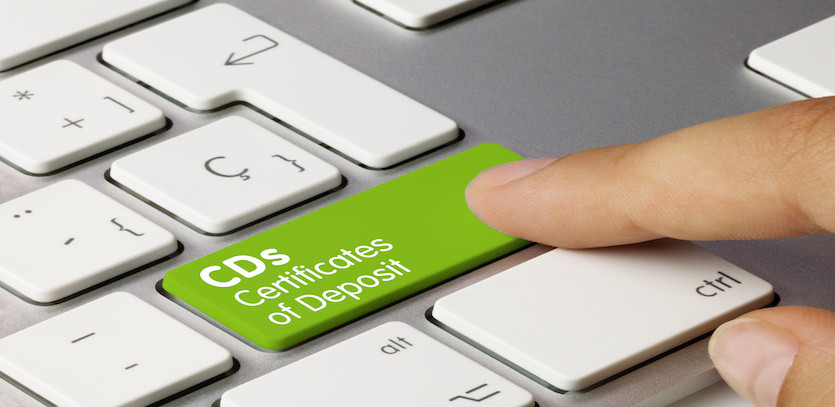Breaking Down Certificate of Deposit (CD)
A Certificate of Deposit, commonly known as a CD, is a financial tool that accumulates interest on a fixed amount over a set period. Unlike a regular savings account, a CD requires the money to be undisturbed for the full term or face penalties or loss of interest. They typically have a higher interest rate compared to savings accounts, making them an attractive option despite the lack of liquidity. CDs are considered a safer and more conservative form of investment compared to stocks or bonds, with guaranteed returns despite the lower growth potential. Banks, credit unions, and brokerage firms all provide a variety of CD options. By shopping around, one can find CD rates that are considerably higher than the industry average for every term.
When someone buys a CD, they commit a specific amount of money for a set duration, for example, a year, to a bank or credit union. In exchange, the institution agrees to pay a predetermined interest rate and guarantees to return the principal at the term's end. For example, an investment of $1,000 in a 1-year, 5% certificate would mean gaining $50 in interest over a year, plus the $1,000 initially invested.
The Fundamentals of Certificates of Deposit (CDs)
Setting up a CD is quite similar to creating a standard bank deposit account. However, the difference lies in what you agree to at the time of signing up. After selecting your CD(s), finalizing the process will involve four elements:
- The interest rate: This is set and provides a predictable return on your deposit over a defined period. Banks cannot alter the rate, which guarantees your earnings. However, a fixed return could be disadvantageous if rates rise significantly during the term of your CD.
- The term: This is the agreed period during which you will keep your funds deposited to evade any penalty. The term concludes on the maturity date, when you can withdraw your funds without penalty.
- The principal: Apart from some specialty CDs, this is the amount you agree to deposit when you open the CD.
- The institution: The bank or credit union where you open your CD will determine certain aspects of the agreement, such as early withdrawal penalties (EWPs) and the reinvestment of your CD if you don't give other instructions at maturity.
Once your CD is set up and funded, it is administered like most other deposit accounts, with regular statement periods and interest payments deposited into your CD balance, where it compounds.
Why Opt for a CD?
CDs offer fixed, safe, and usually federally insured interest rates that can often be higher than many bank accounts. They can be a viable option for savers looking for higher returns than most savings, checking, or money market accounts without exposure to market volatility.
Comparing CDs with Savings or Money Market Accounts
CDs, being a special form of savings instrument, provide a way to save for specific goals like a house down payment, a new car, or a vacation. They can also be used to store funds not needed for daily expenses, ensuring a certain return on your balance.
How CD Rates Are Set?
If you keep a close eye on interest rates or the business news world, you'd know that the Federal Reserve's rate-setting actions significantly impact potential earnings on deposits. The connection between the Fed and a bank's expenses is direct.
The Federal Reserve's Federal Open Market Committee (FOMC) determines whether to elevate, diminish, or maintain the federal funds rate every six to eight weeks. This rate signifies the interest that banks pay to lend and borrow excess reserves to each other overnight via the Fed. The prime rate, the rate banks charge their most credible customers, is influenced by the federal funds rate. Usually, the prime rate is the federal funds rate plus three percentage points. The prime rate then affects the rates for CDs, savings, and loans. A higher prime rate corresponds to more interest you can earn on a CD.
Historically, in December 2008, the Fed slashed its rate to nearly zero to stimulate the US economy out of the Great Recession. This action took a toll on deposit rates across all sectors—savings, money market, and CDs. However, the tide turned in 2022 when the Fed started raising interest rates significantly in response to record-setting inflation. Consequently, between March 2021 and March 2023, average CD rates witnessed a three to four-fold increase.
The individual circumstances of each financial institution also contribute to the amount of interest it offers on particular CDs. For example, if a bank experiences an upsurge in its lending business and requires increasing deposit amounts to finance these loans, it might be more proactive in drawing in deposit customers. Conversely, a large bank with ample deposit reserves might be less inclined to grow its CD portfolio, resulting in less competitive certificate rates.
The Safety of CDs
CDs are among the safest savings or investment options for two reasons:
- First, they offer a fixed and guaranteed rate, eliminating the risk of fluctuating or diminishing returns on your CD. The agreed-upon return at the time of deposit is what you get.
- Second, CD investments are protected by the same federal insurance that covers all deposit products. The Federal Deposit Insurance Corp. (FDIC) insures banks, while the National Credit Union Administration (NCUA) insures credit unions. If you open a CD with an FDIC- or NCUA-insured institution, up to $250,000 of your deposits with that institution are guaranteed by the US government in case of institutional failure.
The probability of bank failures is low, but it's comforting to know that such an event wouldn't endanger your funds. To ensure maximum safety for your funds, choose an institution that carries FDIC or NCUA insurance and avoid exceeding $250,000 in deposits at any single institution. If your deposits exceed this amount, you can maximize your coverage by spreading your funds across multiple institutions and/or names.
When to Consider Opening a CD?
CDs come in handy in several scenarios. Suppose you have some extra cash that you won't need immediately but plan to use in the next few years, perhaps for a special vacation, a new home, car, or boat. In such cases, the stock market is generally not a recommended investment as there is a risk of loss over such a short period.
Alternatively, you might just want a portion of your savings invested very conservatively, or you might prefer to avoid the risk and volatility of the stock and bond markets altogether. Although CDs lack the growth potential of equity or debt investments, they don't pose a risk of downturns. For money that you want to guarantee will increase in value, albeit modestly, CDs can be the right choice.
CDs also serve as a useful tool for disciplined saving.The discipline and low-risk associated with CDs make them an excellent choice for individuals who struggle with saving money. When you purchase a CD, you commit to leaving your money in the bank for a set period. The potential of facing an early withdrawal penalty can deter you from touching the money prematurely. This 'forced' discipline can be helpful for individuals who have the means to save but struggle to resist the temptation to spend.
Drawbacks of CDs
Despite their numerous benefits, CDs are not without their drawbacks:
-
Inflation Risk: One of the significant drawbacks of CDs is the risk of inflation outpacing the return on your investment. This issue is particularly prevalent when inflation rates are high, as they were during 2022 and 2023. If the inflation rate exceeds the interest rate you're earning on your CD, the purchasing power of your savings will diminish over time, even as your account balance grows.
-
Liquidity Risk: CDs are not as liquid as checking or savings accounts. You commit to leaving your money in the bank for a specified term, during which you may face penalties for early withdrawal. Therefore, CDs may not be the best option if you think you might need access to your funds before the end of the term.
-
Opportunity Cost: When you lock your money in a CD, you could miss out on higher returns from other investments. CDs offer lower interest rates compared to investments like stocks and bonds. Although the latter carry more risk, they also have the potential for much higher returns.
Despite these drawbacks, CDs can still be an effective part of a balanced financial strategy, especially for individuals who prefer safer, more predictable investments. They can also serve as a conservative part of a larger, diversified investment portfolio.
How to Choose a CD
Knowing the potential benefits and drawbacks of CDs, how should you go about selecting one? Here are a few factors to consider:
-
Interest Rate: The interest rate is a critical factor to consider when selecting a CD. A higher interest rate means more return on your investment. Keep in mind that rates can vary widely from one financial institution to another, so it's essential to shop around and compare.
-
Term Length: CDs come in various term lengths, ranging from a few months to several years. Typically, the longer the term length, the higher the interest rate. However, remember that you'll need to leave your money in the CD for the full term to avoid early withdrawal penalties.
-
Early Withdrawal Penalties: Before choosing a CD, make sure you understand the early withdrawal penalties. These can take a significant bite out of your earnings if you need to access your money before the term ends. Some CDs, known as "no-penalty CDs," allow you to withdraw your money before the term ends without a penalty, but these usually offer lower interest rates.
-
Institution's Reputation and Stability: It's important to ensure the financial institution where you open a CD is reputable and stable. Most CDs are insured by the FDIC (Federal Deposit Insurance Corporation) or the NCUA (National Credit Union Administration) up to $250,000, but it's still worth checking to confirm.
-
Minimum Deposit Requirement: Some CDs require a minimum deposit to open. This amount varies by institution and can range from a few hundred to several thousand dollars. Be sure you're comfortable with the minimum deposit requirement before you commit.
In conclusion, CDs can be a valuable component of your financial strategy, particularly if you're seeking a low-risk way to grow your savings over a set period of time. However, they aren't for everyone, so it's essential to carefully consider your financial goals, timeline, and risk tolerance before investing in a CD.
Frequently Asked Questions About CDs
After discussing the factors you should consider when choosing a CD, let's address some of the most common questions people have about this type of investment.
-
Can I lose money in a CD? Generally, the risk of losing money in a CD is very low. As long as the bank or credit union is FDIC or NCUA insured, your initial deposit plus any interest earned is guaranteed up to $250,000 per depositor, per institution.
-
What happens when a CD matures? When a CD reaches its maturity date, you'll have a short grace period (usually 7 to 10 days) to make a decision about what to do next. You can withdraw the money, renew the CD for another term, or roll it over into a new CD. If you don't take any action, many banks will automatically renew the CD for the same term at the current interest rate.
-
Is a CD a good investment for retirement? CDs can be part of a balanced retirement investment strategy, particularly for conservative investors seeking stability. However, CDs alone may not provide enough growth potential to meet retirement goals. Other investment vehicles like stocks, bonds, or mutual funds typically offer higher long-term returns and may be necessary to keep pace with inflation.
-
What's the difference between a CD and a savings account? The main differences lie in accessibility and interest rates. A CD typically offers higher interest rates than a savings account, but you can't access your funds without penalty until the term ends. A savings account provides lower interest rates, but you have more flexibility to withdraw funds when needed.
Remember, while CDs are generally a safe investment option, it's important to diversify your investment portfolio and align your investments with your specific financial goals, risk tolerance, and investment horizon. Be sure to consult with a financial advisor if you have any questions or need personalized advice.
The Role of CDs in a Diversified Portfolio
While CDs can be a good choice for those seeking a low-risk investment, they should not be the only investment in your portfolio. The principle of diversification suggests that by spreading investments across various types of assets, you can reduce risk and potentially enhance returns.
Here's how CDs can fit into a diversified portfolio:
-
Risk Management: Since CDs offer a guaranteed return, they can balance higher-risk investments such as stocks or real estate. If the higher-risk investments perform poorly, the guaranteed returns from CDs can help offset these losses.
-
Fixed Income: CDs can serve as a source of fixed income, especially for retirees who require a steady income stream. The predictable nature of CD returns can help in budgeting and financial planning.
-
Reserve Fund: A CD can serve as a place to park your emergency fund or cash reserves. While it doesn't offer the immediate liquidity of a savings account, it provides a higher return while keeping your money safe.
-
Ladder Strategy: A CD ladder involves dividing your total investment across CDs of different maturity dates (for example, 1-year, 2-year, 3-year, etc.). As each CD matures, you reinvest in a new long-term CD. This strategy can provide higher average interest rates, reinvestment opportunities, and staggered access to funds.
It's important to note that while CDs can be part of a well-rounded investment strategy, they may not be suitable for everyone. If you're seeking high growth or need frequent access to your funds, other investment options might be a better fit. Always consider your individual financial goals, risk tolerance, and time horizon when making investment decisions.
Finally, remember that the key to successful investing isn't just about choosing the right investments, but also about maintaining the right balance for your unique needs and goals.
Pros:
-
Low risk: CDs are insured by the FDIC, providing a safe place to store your money.
-
Fixed, predictable return: You'll know exactly how much you'll earn at the end of the term.
-
Variety of terms: You can choose a term length that fits your financial plans.
Cons:
-
Low return: Compared to other investments like stocks or real estate, the return on CDs is relatively low.
-
Limited access to funds: You can't withdraw your money before the term ends without paying a penalty.
-
Inflation risk: If inflation rates rise, the purchasing power of the interest earned can be eroded.
By understanding these pros and cons, you can better determine whether CDs are the right investment for you. Always consult with a financial advisor or conduct thorough research before making any major financial decisions. Remember that successful investing is about more than just choosing individual investments—it's about creating a balanced, diversified portfolio that aligns with your financial goals.





